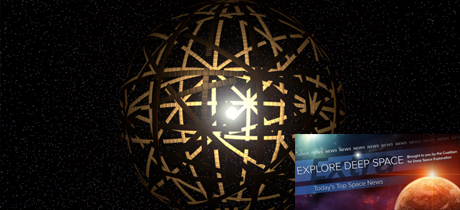Subscribe to our Daily Newsletter:
Don’t miss the latest developments in space policy, science, and exploration with Deep Space Extra, delivered directly to your inbox from Monday to Friday.
|
|
Here is a list of news that were published in our Newsletter the week of March 26, 2023:
Human Space Exploration:
- NASA establishes Moon to Mars Program Office
- Meet Amit Kshatriya, Indian origin robotics engineer, who will head NASA’s first ‘Moon to Mars Office’
- NASA and Roscosmos assessing conditions inside Soyuz MS-22 during re-entry
- Frank Rubio’s first spaceflight will turn into the longest mission by a U.S. astronaut
- Starliner crewed test flight delayed to July
- Lockheed doubles down on lunar economy bet with new subsidiary Crescent Space Services
- Damaged Soyuz MS-22 craft returns home uncrewed
- Ken Bowersox to succeed retiring SOMD head Kathy Lueders
- Russia’s leaky Soyuz capsule will depart Space Station on March 28. Here’s how to watch it live online.
- Dream Chaser is delayed again, raising questions about Vulcan launch plans
- Canada commits to ISS through 2030 as Biden highlights Artemis cooperation
Space Science
- Hubble telescope spies mysterious celestial object that defies classification.
- The deadly atmosphere on Venus could help us find habitable worlds.
- Bits of Saturn’s rings are falling onto the planet and heating it up
- NASA prepping for September arrival of OSRIS-REx asteroid sample
- The largest black hole ever discovered can fit 30 billion suns. We found it with gravity and bent light
- NASA lays out vision for robotic Mars exploration
- Are we alone? The answer might be in space dust that’s all around us
- Tiny Lunar Flashlight Moon probe is in trouble. NASA has one month to fix it
- Would building a Dyson sphere be worth it? We ran the numbers
- Saturn moon Titan could hold the clues to life’s origin. This NASA drone could find them
- Intriguing Moon water source found in glass beads from impacts
- A stunning lineup of five planets will decorate the night sky
- The universe might be shaped like a doughnut, not like a pancake, new research suggests
- Artificial intelligence could help hunt for life on Mars and other alien worlds
Other News
- Virgin Orbit to shut down after failing to find a financial lifeline
- Russia launches classified payload from Plesetsk on Soyuz-2.1v
- Air Force Secretary: ‘Haven’t made a decision on U.S. Space Command’
- China to begin constructing its own megaconstellation later this year
- Israel launches new ‘Ofek 13’ spy satellite into orbit
- U.S. allies in the Middle East express interest in establishing space forces
- Cape congestion: World’s busiest spaceport stretched to its limits
- Advisory group backs European human spaceflight program using commercial approaches
- OneWeb completes initial constellation with launch from India
Major Space Related Activities for the Week
- Phillip Washington has withdrawn his nomination to become the FAA Administrator, which is home to the Office of Commercial Space Transportation, due to Senate political differences.
- The National Academies of Sciences, Engineering and Medicine is presenting its annual Space Science Week program from Washington on Tuesday through Thursday. Committee topics will range from Earth to Biological Science, Astrophysics and Solar physics. Topics will include managing science as part of NASA’s Artemis program. Open sessions will be live streamed.
- The AIAA is hosting its ASCENDTexas session on Wednesday and Thursday. Topics include International Partnerships and Engagement; Challenges to Commercialization; and NASA Program Updates.
- Early Tuesday, Russia’s Soyuz MS-22 crew transport, which experienced an external coolant leak on December 14, will depart the International Space Station (ISS) for an uncrewed descent under parachute into Kazakhstan. After the coolant leak, the MS-22 was deemed unsafe for all but a possible emergency departure from the ISS with cosmonauts Sergey Prokopyev and Dmitri Petelin. They launched to the ISS with NASA astronaut Frank Rubio on September 21. Originally, the three were to return to Earth together in March. The Soyuz MS-22 was replaced with the Soyuz MS-23, which launched and docked to the ISS with no one aboard over February 23-25. Rubio, Prokopyev, and Petelin have had their six-month mission extended as a result of the coolant leak.

